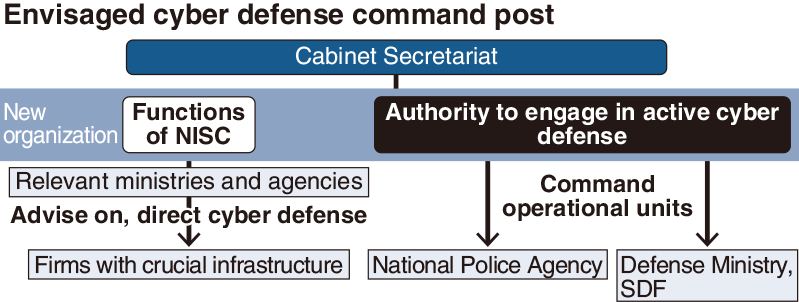
15:50 JST, November 1, 2022
A command post to direct the nation’s defense against cyber-attacks is being planned for the Cabinet Secretariat, according to government sources.
The new organization will take over the functions of the Cabinet’s existing National center of Incident readiness and Strategy for Cybersecurity (NISC) and become a stronger entity through expansions in scale and authority.
One of its new roles is to direct a framework known as active cyber defense (ACD), which involves detecting signs of cyber-attacks and identifying the sources of such attacks.
While NISC was established based on a government ordinance, the new organization with its stronger authority is planned to be established based on laws. The government aims to submit a related bill to the Diet as early as autumn next year.
With the advancement of digitization, the risks are increasing for cyber-attacks that involve stealing confidential information or disrupting business operations. In a contingency, there are concerns that cyber-attacks could cripple critical infrastructure such as power grids and railroads.
In Japan, however, the response to such attacks has largely been left to the efforts of individual ministries and companies.
The new organization is expected to be headed by an official at the level of assistant chief cabinet secretary or higher. In addition to NISC’s existing role of providing advice and information to relevant ministries, agencies and companies, the new organization’s important task will be to engage in ACD.
The new organization is mainly envisioned as commanding the operational cyber units of the Defense Ministry and the Self-Defense Forces. Recruiting of private hackers will also be considered for the organization to gain additional cyber defense capabilities.
The government plans to include a policy to introduce the ACD framework in the National Security Strategy to be revised by the end of this year. ACD enters systems and networks to patrol and monitor cyberspace, detecting and responding to suspicious activities that could pose a threat to national security.
Since such activities are not allowed under current laws and regulations, the amendment of laws such as the Law on Prohibition of Unauthorized Computer Access will be needed. Also under consideration is establishing a watchdog system in which legal experts among others examine how the new authority is exercised.
Top Articles in Politics
-

LDP Wins Historic Landslide Victory
-

Japan Tourism Agency Calls for Strengthening Measures Against Overtourism
-

LDP Wins Landslide Victory, Secures Single-party Majority; Ruling Coalition with JIP Poised to Secure Over 300 seats (UPDATE 1)
-

Japan’s Prime Minister: 2-Year Tax Cut on Food Possible Without Issuing Bonds
-

Voters Using AI to Choose Candidates in Japan’s Upcoming General Election; ChatGPT, Other AI Services Found Providing Incorrect Information
JN ACCESS RANKING
-

Japan Institute to Use Domestic Commercial Optical Lattice Clock to Set Japan Standard Time
-

China Eyes Rare Earth Foothold in Malaysia to Maintain Dominance, Counter Japan, U.S.
-

Man Infected with Measles May Have Come in Contact with Many People in Tokyo, Went to Store, Restaurant Around When Symptoms Emerged
-

Japan, Qatar Ministers Agree on Need for Stable Energy Supplies; Motegi, Qatari Prime Minister Al-Thani Affirm Commitment to Cooperation
-

Australian Woman Dies After Mishap on Ski Lift in Nagano Prefecture























